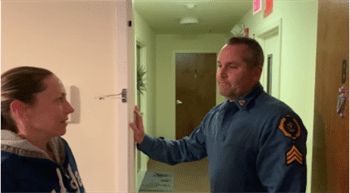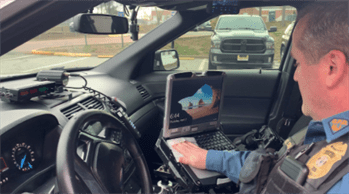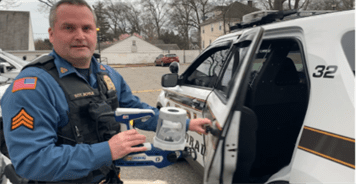My father, Kevin Doyle, wakes up at 6 a.m. and gets ready for work. He brushes his teeth, showers and leaves the bathroom with a clean-shaven face. He puts on a t-shirt and black cargo pants with an unnecessary amount of pockets. He strolls into the kitchen and enjoys breakfast with his wife, Mary Doyle, just like any other day, except now, his mind is racing elsewhere.
“Really, I’ll be fine. I have the whole mask and stuff and I’m not going near people. We’re gonna get through this,” Kevin Doyle said.
“I know. I just worry, it’s something else to add onto my stress,” Mary Doyle said.
“You always worry,” Kevin Doyle said.
Kevin Doyle dabs the crumbs around his mouth with his napkin and mutters something incomprehensible to his wife. Then, he stands up and leans in for a quick kiss.

Mary Doyle’s family has been heavily involved in law enforcement throughout her life.
Kevin Doyle | The Montclarion
Kevin Doyle’s confident demeanor changes as he walks to the car and becomes weary. He wasn’t trained to work through a pandemic.
Kevin Doyle arrives at the police station and heads straight to his locker to finish the rest of his morning ritual. He slips into his bulletproof vest and buttons his blue police shirt over it. Gold badges and pins flash on his uniform as he greets his coworkers holding a cup of coffee.
As a dedicated police officer of almost 25 years, Kevin Doyle has been involved in a number of shootouts, prevented suicides and even rescued a newborn baby struggling to breathe.
Since the coronavirus outbreak, the Oradell Police Department has seen a drop in crime rates but tensions still remain high.
Each call the officers receive could be virus related, a domestic dispute or a situation that requires the officers to enter someone’s home. Kevin Doyle is tense throughout his 12-hour shifts, dreading calls from residents seeking help. Entering a stranger’s house could mean exposing himself and others to the virus.
“As a wife you have to be there, to listen to him and talk about it,” Mary Doyle said. “But if he doesn’t want to talk about it then you can’t push him either.”
Unlike a gunman or a robber with a clear identifiable face, the coronavirus is invisible and can’t be caught. This has posed problems and forced the Oradell Police Department to come up with creative ways of limiting the spread of the virus.
After each shift, Kevin Doyle sprays sanitizer into his police car and wipes down the steering wheel with sanitizing wipes. Officers come into contact with many people daily and must take extra precautions.
In the passenger seat of the police car now lies a duffel bag with N-95 masks, robes, gloves, Narcan and other supplies.

Kevin Doyle wipes down every device in the police car before and after his shift.
Kevin Doyle | The Montclarion
Residents frequently call with coronavirus related emergencies so officers must be prepared with these supplies. Kevin Doyle is used to putting others’ lives before his own and desperately wants to help people. However, in these cases, he can’t do much but wait until the paramedics arrive.
Weekly schedules are adjusted so the same officers work together and reduce the risk of transmitting the virus to someone new. Brennen Page, Kevin Doyle’s police partner, is a patrolman and concerned about going home to his family.
“I’m personally kinda paranoid because I have two small kids at home,” Page said. “And with my wife still working, my biggest concern is bringing something home to them.”
Page reported that there is less “normal” police work to be done. With schools and businesses closed, along with people staying home, there are fewer burglaries and crimes being committed. Cops are even refraining from pulling people over on the roads.
The long wooden table in the back of the police department where officers would usually gather to eat, now serves a different purpose. Covered in an array of cleaning and disinfecting products, the table that once hosted end-of-shift discussions now lies with only past memories.
As people in New Jersey become increasingly impatient with Gov. Murphy’s strict stay-at-home orders, cops must remind people to adhere to social distancing guidelines. With the summer season approaching, it is not an easy feat when warmer weather brings more people outside.
“Yesterday I received a call from a resident complaining about a backyard barbecue,” Kevin Doyle said. “She said there were ‘too many’ people. I get it but how am I supposed to stop that? They’re technically not breaking any laws.”
Police officers continue to navigate through the murky waters of the ever-changing pandemic. Unfortunately, cops do not have the power to lock the virus behind bars, but they are developing tactics to slow the spread and encouraging the public to do the same.
After a long day, Kevin Doyle returns home as the sun sets and the world seems calm and still, almost as if the virus suddenly disappeared. Kevin Doyle opens the door and is hastily greeted by his wife without a kiss, having to wash up first.
“You’ve been taught how to avoid getting hurt on motor vehicle stops and how to protect yourself against numerous things,” Kevin Doyle said. “This is an enemy you can’t see. You’re fighting against something invisible.”



